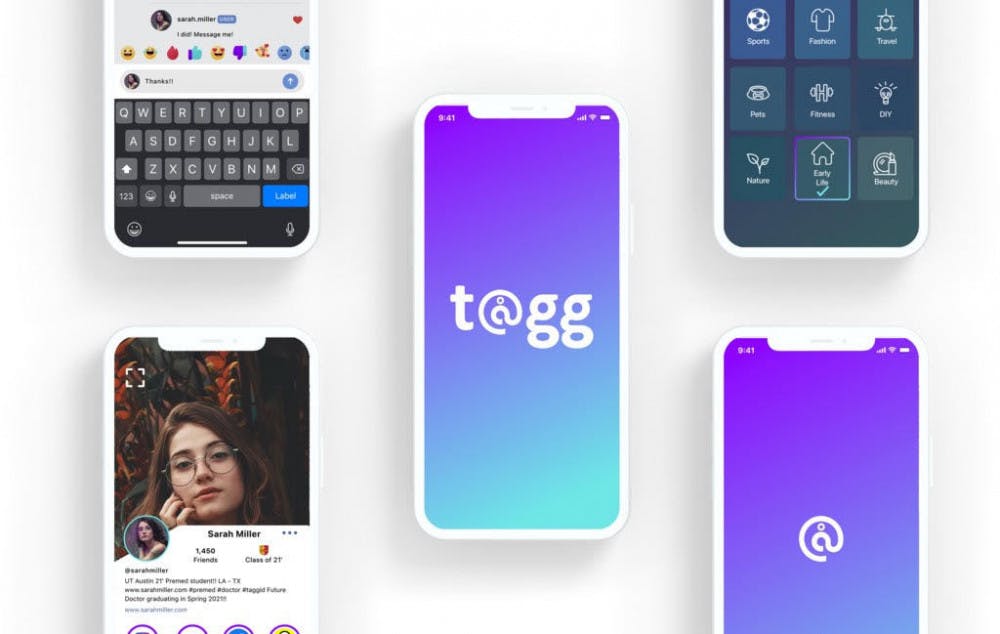As a player on the Brown football team, Victor Loolo ’20 found himself struggling to branch out beyond the student-athlete community. He began dreaming of a social networking platform that could connect students to those with whom they may not otherwise cross paths.
In pursuit of this idea, Loolo, along with football teammate Blessing Ubani ’21, and friends Husam Salhab ’21 and Rhode Island School of Design senior Sophie Chen, collaborated to co-create an app, Tagg, which allows students to share their interests and passions.
The co-founders all found themselves sharing similar feelings of being pigeonholed into niche groups and wanting an easier way to connect with different students. The app, released Feb. 2, allows users to post photos under categories that represent different aspects of their lives and personalities.
The app, with graphics designed by Chen, reflects Tagg’s goal in allowing users to create an “authentic online identity,” said Chen, where users are able to upload any and all pictures they desire to showcase their interests without the pressure of likes.
“We saw social media evolve and we know that likes create a hierarchical system,” Loolo said. “We wanted to create a space where (users) can feel safe to express themselves.”
While the social media app market is fairly saturated, Loolo said, Tagg is “therapeutic” and a “break from the toxic world” in that users are not “trying to fill some sort of aesthetic or get an average amount of likes.”
Along with a few other Brown students who volunteered to help “here and there,” Salhab took the lead on building “the app from scratch.”
“We had to roll up our sleeves and figure out how to do a lot of very technical things,” Salhab said.
During the app’s development, the founders organized focus groups of students in order to test out their ideas and gauge a demand for another social networking app. Students signed up to indicate interest in participating in the focus groups with an outside party overseeing the activities.
“Starting in April through the summer, we held 20 to 25 focus group sessions with an average of seven students each,” Loolo said.
Lauren Reischer ’21 and Sara Bermudez ’22 both participated in the focus group study where the co-founders explained the vision behind Tagg and offered scenarios as to how the app could be used. The co-founders, at the time, were deciding whether the app should lean more professional or social.
“If you go professional, you (silo) yourself into one space,” Loolo added. But the team did not want to become a “a baby LinkedIn.”
Instead, Ubani said, the team wanted to “build a social space that would allow users to organically collaborate and represent themselves and find other people in their communities.”
As the four co-founders sought to increase awareness of the new platform, they relied on the help of other Brown students to distribute “Tagg Daily Herald” newspaper articles and branded cards. The Tagg team also highlights Tagg users through spotlight campaigns on the app’s Instagram page, and Tagg representatives recently appeared on the Main Green for “Tagg Trivia” to drum up excitement about the platform and to engage with the app’s user base.
Currently, the app is only available for use by Brown students, but Loolo hopes to expand into other universities soon.
“We have 1,300 students from Brown on the application and hundreds more on the waitlist. We let in about 10 to 15 Brown students per day off the waitlist, but we have students from 24 other universities on the waitlist as well,” Loolo said.
The founders verify that each student attends the University before allowing them off the waitlist, thereby giving them permission to utilize the app.
Though the app has only been out for a few months, it has already gone through some changes in order to better accommodate its users’ wants and needs.
“It is social media, so we are never done developing it. We are always continuing to build and listen to market feedback,” Ubani said.
A new feature allows users to identify with certain sports teams or student groups on campus by adding a respective “badge” to their profiles. Users can also search by groups to find other students to connect with.
Given the limited opportunities for social interactions due to the COVID-19 pandemic, some users have found themselves checking Tagg a few times a day.
“I find myself engaging with it more frequently because there’s so many more users,” Bermudez said. She added that “it’s fun to post, and I feel a lot safer posting” more authentic content on Tagg than on other social media platforms like Instagram because the app offers a closer-knit community, given that all users have the shared identity of being Brown students.
Tagg has also provided an avenue for users to reconnect with past acquaintances and facilitate more social connections.
“Being a remote student, Tagg has made it easier to stay connected with friends and classmates on campus,” said Chris Berger ’21.
Reischer praised the app’s “spot on” and “smart” method of suggesting people to connect with. “It’s mostly done a good job of finding people I already knew that are new to the app,” she said. Most of her suggestions have been people she hasn’t seen since events such as A Day on College Hill or the Third World Transition Program that she participated in prior to her freshman year, she said.
While managing schoolwork and Tagg has been “tough,” the co-founders said the work they do through the app is rewarding.
“It is hard because I am way more interested in what is going on in Tagg at any given moment, the code I am writing for Tagg is more interesting than the code for my CS classes,” Salhab said.
“It has been an exciting thing to be a part of,” Bermudez said, “seeing the growth from just an idea to an actual app.”

ADVERTISEMENT




